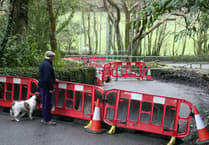ONE of West Devon's lesser known beauty spots is Lopwell Dam, located three miles north of Plymouth and seven miles from Tavistock.
Owned by South West Water and managed by South West Lakes Trust, this wildlife haven is found on the upper tidal mark of the River Tavy and provides an excellent site for bird watching, walking and cycling.
The area is a designated Local Nature Reserve covering an area of approximately five hectares. It consists of several different habitats including mudflats, freshwater marsh, wildflower meadow, scrub-grassland, saltmarsh and semi-natural woodland. The area is also designated as a Site of Special Scientific Interest.
The Lopwell Dam local nature reserve walk is approximately 1.25miles in length (45 minutes to one hour) and along the way are information boards showing the history and wildlife of the site.
Before the severing of the main Plymouth to London line in the late 1960s at Bere Ferrers and Tamerton Foliot, market gardening was a key industry in the Tamar Valley. Lorries would be driven over Lopwell ford carrying fruit and vegetables heading for the railway stations or, in earlier times, offloaded onto boats to take down river to Plymouth. Those days are long gone but over the years Lopwell is playing an increasing role in the supply of water to the growing city of Plymouth.
Water collected at Roadford Lake, situated between Okehampton and Launceston, is pumped into the the Tavy and backed up at Lopwell, where it is extracted and pumped up to Crownhill and onto the rest of Plymouth.
Lopwell's first pump station and dam was built on site in 1953 and in 1981 a second pump station was added to cope with increased demand. In 2009 South West Water decided to modernise the pump station to secure the supply of water to Crownhill Water Treatment Works.
The 10 pumps installed in the 1980s were replaced with six energy-efficient pumps during the refurbishment. This led to a 23% reduction in energy consumption and a 30% reduction in overall energy use at Lopwell. The pumps themselves can now be monitored and operated remotely, reducing frequency of staff visits.
Neil Reeves is the countryside manager for 26 sites belonging to the South West Lakes Trust, including Burrator, Roadford and Lopwell.
He told the Times that the trust has four main areas of management at its sites — conservation to encourage natural wildlife and fauna; providing safe public access; promoting recreation such as walking, cycling and water based activities and education — the trust do a lot work with schools and colleges.
'An important thing about Lopwell is its location, just 10 minutes away from the doorstep of people living in Plymouth,' said Neil.
'One of Lopwell's special traits is that it is a place where fresh water meets salt water, divided by the dam. If it wasn't for the dam, the sediment from the river would come down stream and would have kept the salt marsh in place. As a result of the dam we have different wildlife conditions within 50 metres of each other.
'On the estuarine side there is sea fish like grey mullet and flat fish such as flounder. Salmon migrate up the river and a fish pass has been installed to aid their passage. On rare occasions, at the end of the year, you can even see a seal, who follows the salmon up river.
'This is a fantastic spot for birdwatchers, with egrets, kingfishers and ospreys and often you can see otters at the top of the dam waiting for the fish.'
'Lopwell is also a very good site for bats; we have seven or eight different species. You can see bats swooping down on top of the water, looking to feed on insects.
'Also, on top of the new pump house we are developing a butterfly meadow where we are are encouraging wildflowers to grow so, in turn, they will attract a wealth of butterfly species.
'We are also responsible for the management of the trees along the river banks. We also are trying to stop invasive species growing, not natural to this environment, such as Japanese knotwood or Himalayan balsam, from taking over and shading out the wild flowers.
'This is primarily a nature reserve so there is a fine balance of keeping it safe for people and at the same time, as far as possible, letting nature take its course, so that visitors can enjoy Lopwell's natural beauty.'
Those who would like a 'Lopwell Walks' leaflet to guide them around the site, including information on flora and fauna, should call SWLT's head office on 01566 771930.
For the active the Bere Peninsula cycle route runs nearby, and the Tamar Discovery Trail begins at Lopwell.
There is also a cafe and visitor centre on site all set in the Old Pump House on the Dam. Watch out for that grey seal as you enjoy a Devon cream tea from its terrace!



